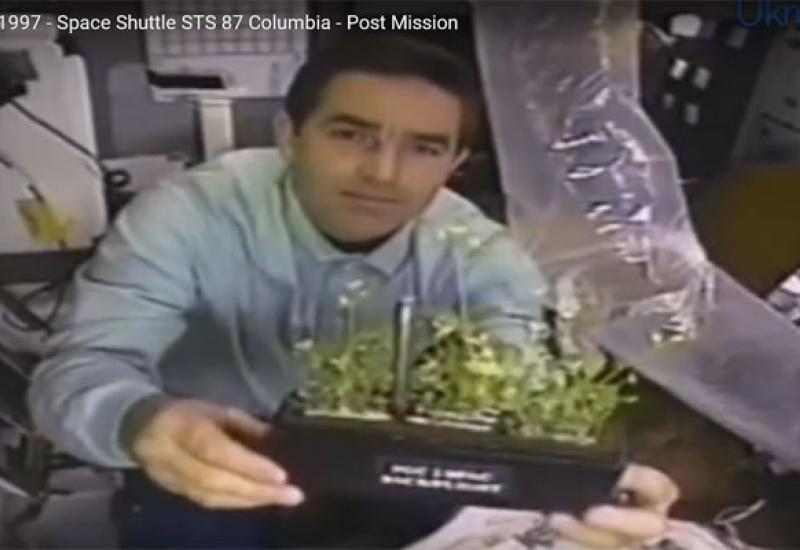This year is the 25th anniversary of the founding of the National Space Agency of Ukraine and 20 years of space flight of the first astronaut of independent Ukraine Leonid Kadeniuk within the programme of Ukrainian-American mission STS-87. Being the part of an international crew on the ship "Columbia", he spent in orbit more than 15 days and performed a wide range of activities under the joint Ukrainian-American experiment whose purpose was to study the influence of microgravity on the growth and development of plants (Project supervisor - prof. Yelyzaveta Kordium). In the experiment preparation, scientists from American universities and academic institutions of NAS of Ukraine were involved. Among the direct participants of the events there were scientists of Bogomolets NMU and Kyiv Polytechnics.
In particular, prof. Valentyn Yatsenko, being the head of the problem Commission of Ministry of Health of Ukraine "Space Biomedicine" in 1993-1997, was lucky to participate in all phases of the space program of Ukraine: selection of Ukrainian astronauts, together with US formation experts of pre-flight training programmes of Ukrainian astronauts, presence on the launch site Cape Canaveral before launch during implementation and after successful completion of mission STS-87, including a visit to the launch pad and extracting the memory "gifts" in the form of fused elements covering the first stage and the shuttle burnt land.
More information on these events can be found in two books: "Space Biomedicine", Problem Commission of the Ministry of Health and Medical Sciences of Ukraine (1996-2001) and "Space Biomedicine" Problem Commission of Ministry of Health and Medical Sciences of Ukraine, annotated report (1996-2002). Monographs were published through careful work of the commission "Space Biomedicine" members of Ministry of Health and NAS of Ukraine: V. P. Yatsenko (Chairman), L. L. Arshynnykova (scientific secretary) and members of the Commission: N. V. Rodionov (Institute of Zoology named after Schmalhausen of NAS of Ukraine); O. H. Reznikov (Institute of Endocrinology and Metabolism named after V. P. Komisarenko); L. O. Stechenko (NDLTS of Bogomolets NMU) ; N. A. Kolesova (NDLTS of Bogomolets NMU) ; V. M. Belskyi (Donetsk State University); V. M. Baryliak (Ukrainian Scientific Hygienic Center MoH Ukraine); I. H. Anisimova (NDLTS of Bogomolets NMU) ; I. O. Parpalei (Bogomolets NMU); A. I. Hozhenko (Clinical Diagnostic Consulting Center Ukrainian scientific-practical association "Medical transportation").
Space Biomedicine is a fundamental scientific section of space medicine that studies the impact of space flight factors on various biological objects to demonstrate the mechanisms of their action on the human body, space flight safety, maintaining the health and performance of astronauts in terms of short-term and long-term space flights. For interaction of future professionals in the field of biomedical sciences and engineering, the formation of personality with active science and life position, School of Space Biomedicine was created within the framework of the biomedical space at Bogomolets NMU (Head - prof. V. P. Yatsenko, coordinator - A. R. Kohdenko). It was visited by pupils and students with basic knowledge of biology and physics, seeking to understand the concerns of Space Biomedicine, learn about the development of modern astronautics, acquire new knowledge, skills and technologies.
Anna Kohdenko was also directly involved in the space programme and was present at the launch site at Cape Canaveral (USA) during the launch of US-Ukrainian crew of mission STS-87. After successful completion of the mission, Anna Romanova, as coordinator of the School of Space Biomedicine of Bogomolets National Medical University student of NATIONAL PEDAGOGICAL DRAGOMANOV UNIVERSITY , together with scientists of teaching and research laboratory centre (TRLC) took active part in conducting research on the study of the impact of multi-directional gravity on the structural elements of the peripheral nerves. She also continued her cooperation with the astronauts Leonid Kadeniuk and his backup pilot - cosmonaut-researcher Yaroslav Pustov within the School of Space Biomedicine.
Yaroslav Tsekhmister, doctor of sciences, vice-rector for educational work of Bogomolets NMU, Director of the Ukrainian Medical Lyceum mentions that in 1995-2000 special attention was paid to the development of youth interdisciplinary research and educational programmes in space biomedicine. The basic idea of it was in the union of Ukrainian university students that of various specialities (engineers, biologists, doctors) and secondary schools pupils, and students of medical lyceum of Bogomolets NMU for their participation in scientific research in space biomedicine conducted at the National Medical University and partner universities.
According to Yaroslav, gained global experience of exploration of near space and planetary space allowed to define the main strategy for the XXI century, i.e. the implementation of long space flight through the creation of an international inhabited space station, inhabited lunar space platforms, circumnavigation of Mars. One of the essential components in the implementation of this strategy is to train astronauts and researchers with knowledge and skills to perform a wide range of biomedical tasks during long space missions: to provide the necessary security settings and habitats, personal care and performance of crew members, performance space biomedical research factors influence extended spaceflight on plant and animal organisms.
In their speeches, the first astronaut of independent Ukraine L. K. Kadeniuk repeatedly stressed on the restructuring and commercialization of the space industry, including creating their own launch vehicles, providing technical assistance in the construction and operation of starting systems in other countries with their consent, conducting various medical, biological experiments in space and so on. So research of the scientists from Bogomolets NMU and Igor Sikorsky KPI is promising and popular.

